BMW 5 Series Saloon vs VW Tiguan – Which one offers the better deal?
Everyday use, family trips or long-distance drives – here’s where the differences show.
Discover whether BMW 5 Series Saloon or VW Tiguan fits your lifestyle better.
Costs and Efficiency:
Price and efficiency are often the first things buyers look at. Here it becomes clear which model has the long-term edge – whether at the pump, the plug, or in purchase price.
VW Tiguan has a clearly advantage in terms of price – it starts at 32800 £, while the BMW 5 Series Saloon costs 50800 £. That’s a price difference of around 18043 £.
Fuel consumption also shows a difference: VW Tiguan manages with 0.40 L and is therefore significantly more efficient than the BMW 5 Series Saloon with 0.60 L. The difference is about 0.20 L per 100 km.
As for range, the VW Tiguan performs to a small extent better – achieving up to 129 km, about 24 km more than the BMW 5 Series Saloon.
Engine and Performance:
Power, torque and acceleration say a lot about how a car feels on the road. This is where you see which model delivers more driving dynamics.
When it comes to engine power, the BMW 5 Series Saloon has a decisively edge – offering 727 HP compared to 272 HP. That’s roughly 455 HP more horsepower.
In acceleration from 0 to 100 km/h, the BMW 5 Series Saloon is decisively quicker – completing the sprint in 3.50 s, while the VW Tiguan takes 5.90 s. That’s about 2.40 s faster.
In terms of top speed, the BMW 5 Series Saloon performs slight better – reaching 250 km/h, while the VW Tiguan tops out at 242 km/h. The difference is around 8 km/h.
There’s also a difference in torque: BMW 5 Series Saloon pulls significantly stronger with 1000 Nm compared to 400 Nm. That’s about 600 Nm difference.
Space and Everyday Use:
Cabin size, boot volume and payload all play a role in everyday practicality. Here, comfort and flexibility make the difference.
Both vehicles offer seating for 5 people.
In curb weight, VW Tiguan is a bit lighter – 1599 kg compared to 1800 kg. The difference is around 201 kg.
In terms of boot space, the VW Tiguan offers evident more room – 652 L compared to 520 L. That’s a difference of about 132 L.
When it comes to payload, BMW 5 Series Saloon a bit takes the win – 600 kg compared to 533 kg. That’s a difference of about 67 kg.
Who comes out on top?
Overall, the BMW 5 Series Saloon shows itself to be wins the duel decisively and secures the title of DriveDuel Champion.
It convinces with the more balanced overall package and proves to be the more versatile choice for everyday use.
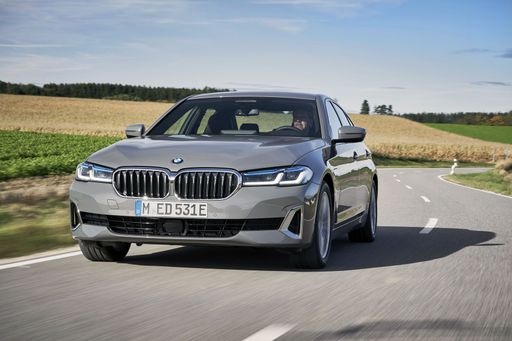
BMW 5 Series Saloon
BMW 5 Series Saloon
The BMW 5 Series Saloon stands as a hallmark of luxury and performance in the executive car sector. Its sleek design combines elegance with a sporty edge, offering a driving experience that is both dynamic and comfortable. Inside, the cabin is crafted with premium materials and cutting-edge technology, ensuring every journey is a refined affair.
details @ press.bmwgroup.com
@ press.bmwgroup.com
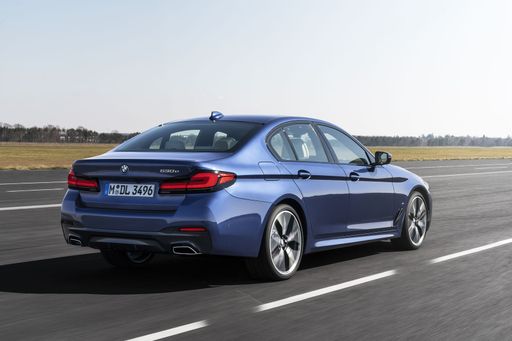 @ press.bmwgroup.com
@ press.bmwgroup.com
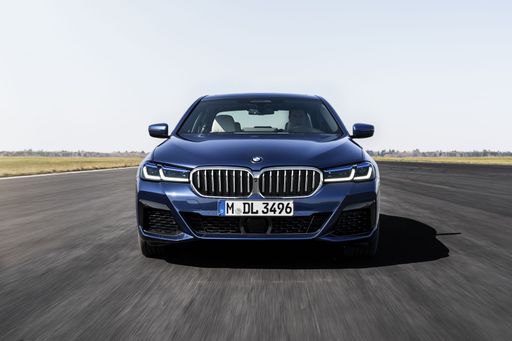 @ press.bmwgroup.com
@ press.bmwgroup.com
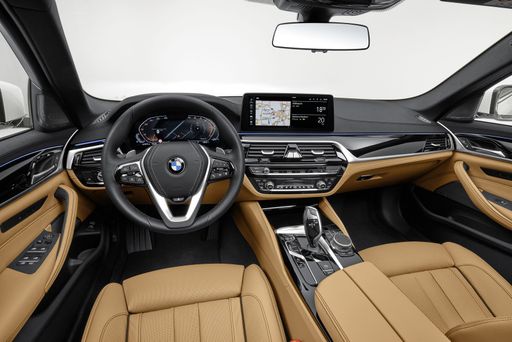 @ press.bmwgroup.com
@ press.bmwgroup.com
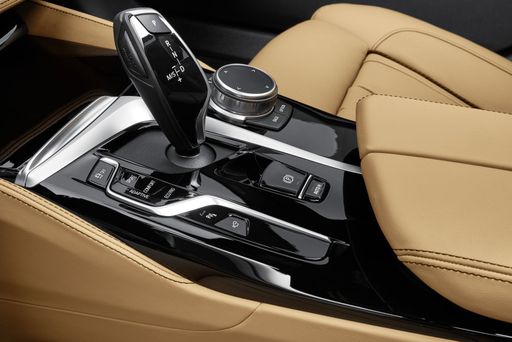 @ press.bmwgroup.com
@ press.bmwgroup.com
VW Tiguan
The VW Tiguan presents itself as a versatile and practical option in the SUV market, combining a stylish design with a spacious and comfortable interior. It offers a smooth driving experience, making it well-suited for both urban environments and longer journeys. With its focus on safety and innovative technology features, the Tiguan remains a compelling choice for families and adventurers alike.
details @ Volkswagen
@ Volkswagen
 @ Volkswagen
@ Volkswagen
 @ Volkswagen
@ Volkswagen
 @ Volkswagen
@ Volkswagen
 @ Volkswagen
@ Volkswagen
 @ Volkswagen
@ Volkswagen

|

|
|
|
|
Costs and Consumption |
|
|---|---|
|
Price
50800 - 123800 £
|
Price
32800 - 51900 £
|
|
Consumption L/100km
0.6 - 5.8 L
|
Consumption L/100km
0.4 - 8.4 L
|
|
Consumption kWh/100km
-
|
Consumption kWh/100km
-
|
|
Electric Range
69 - 105 km
|
Electric Range
119 - 129 km
|
|
Battery Capacity
18.6 - 19.4 kWh
|
Battery Capacity
19.70 kWh
|
|
co2
13 - 152 g/km
|
co2
8 - 190 g/km
|
|
Fuel tank capacity
60 L
|
Fuel tank capacity
45 - 58 L
|
Dimensions and Body |
|
|---|---|
|
Body Type
Sedan
|
Body Type
SUV
|
|
Seats
5
|
Seats
5
|
|
Doors
4
|
Doors
5
|
|
Curb weight
1800 - 2510 kg
|
Curb weight
1599 - 1890 kg
|
|
Trunk capacity
466 - 520 L
|
Trunk capacity
490 - 652 L
|
|
Length
5060 - 5096 mm
|
Length
4539 mm
|
|
Width
1900 - 1970 mm
|
Width
1842 - 1859 mm
|
|
Height
1510 - 1515 mm
|
Height
1656 - 1658 mm
|
|
Max trunk capacity
-
|
Max trunk capacity
1486 - 1650 L
|
|
Payload
430 - 600 kg
|
Payload
460 - 533 kg
|
Engine and Performance |
|
|---|---|
|
Engine Type
Diesel MHEV, Plugin Hybrid, Petrol MHEV
|
Engine Type
Plugin Hybrid, Petrol, Petrol MHEV, Diesel
|
|
Transmission
Automatic
|
Transmission
Automatic
|
|
Transmission Detail
Automatic Gearbox
|
Transmission Detail
Dual-Clutch Automatic
|
|
Drive Type
Rear-Wheel Drive, All-Wheel Drive
|
Drive Type
Front-Wheel Drive, All-Wheel Drive
|
|
Power HP
197 - 727 HP
|
Power HP
130 - 272 HP
|
|
Acceleration 0-100km/h
3.5 - 7.5 s
|
Acceleration 0-100km/h
5.9 - 10.6 s
|
|
Max Speed
225 - 250 km/h
|
Max Speed
198 - 242 km/h
|
|
Torque
330 - 1000 Nm
|
Torque
220 - 400 Nm
|
|
Number of Cylinders
4 - 8
|
Number of Cylinders
4
|
|
Power kW
145 - 535 kW
|
Power kW
96 - 200 kW
|
|
Engine capacity
1995 - 4395 cm3
|
Engine capacity
1498 - 1984 cm3
|
General |
|
|---|---|
|
Model Year
2023 - 2025
|
Model Year
2024 - 2025
|
|
CO2 Efficiency Class
D, E, B
|
CO2 Efficiency Class
B, G, D, E, F
|
|
Brand
BMW
|
Brand
VW
|
What drivetrain options does the BMW 5 Series Saloon have?
Available configurations include Rear-Wheel Drive or All-Wheel Drive.
The prices and data displayed are estimates based on German list prices and may vary by country. This information is not legally binding.
